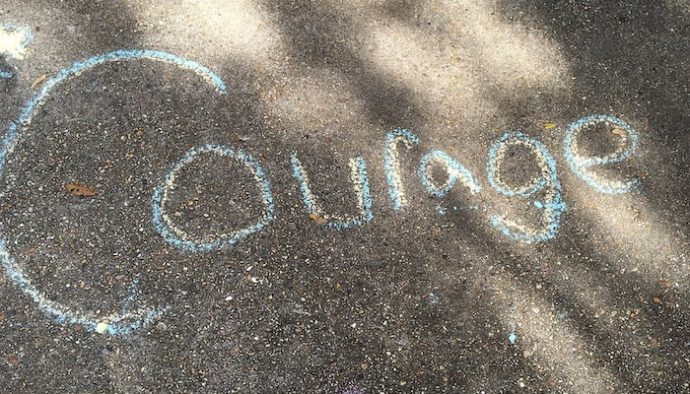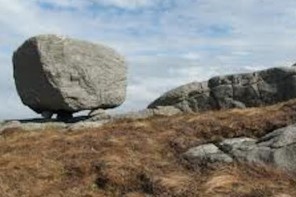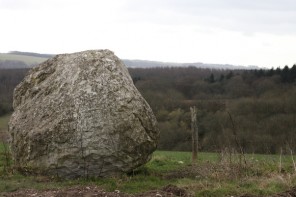Courage is defined, according to the interwebs, like this: “The quality of mind or spirit that enables a person to face difficulty, danger, pain, etc., without fear; bravery.”
That’s what it means, but I’m more interested for the moment in the pictures that come to mind when you mention courage. I think most of us think not of the quality itself, but rather of expressions of courage:
- The first responders who rush in while everyone else runs away.
- The visionary business leader who believes in his or her venture when no one else does.
- The athlete who plays through an injury in order to secure victory.
These are, no doubt, acts of courage. But they are also acts of courage that we have the privilege of bearing witness to. Surely, though, courage is not only a quality expressed in visible, life-changing, and heralded moments like this. Surely there are other acts of courage that go quietly unnoticed, living behind the scenes and out of the spotlight.
What about those expressions of courage? We must also include expressions like that in our thinking, lest we fall victim to the mindset that only those who are lauded for their courage are the ones expressing it. To that end, I wonder if possibly our understanding of courage has not become mingled with fame and celebrity. And if that’s the case, then our understanding of courage needs some correctives, perhaps in at least three ways:
1. Courage means staying, not always going.
We tend to think of courage as those willing to blaze a trail, to go new places, and to take risks in some new venture. But courage isn’t always about leaving; sometimes the most courageous thing to do is stay.
I’m thinking of the husband and father who has a dream of one career and yet stays in his regular job in order to provide for his family. I’m thinking of the son or daughter who makes the courageous choice to stay close to their aging relatives even though they might could make more money in a job in another city. I’m thinking of the pastor who could float his resume to this church or that one, much bigger than the one he’s currently in, and yet he stays to faithfully love and care for his people.
This is courage. It’s not the courage that’s broadcasted, but it’s courage nonetheless.
2. Courage is down in the dirt, not always up in the stars.
Sometimes courage finds itself actuated up in the stars. These are bold acts of courage often with public witnesses and the deserving accolades that come along with them. But there are other acts of courage, more common ones, that go unnoticed because they are down on the dirt.
I’m thinking of the friend who is willing to go to another and have a hard conversation because it’s the right thing to do for the sake of the gospel and their friend’s spiritual future. I’m thinking of the pastor who spends hours counseling the same couple over the same issues no matter how tedious and repeated their offenses are against one another. I’m thinking of the high school student who is willing to befriend the new kid who doesn’t look, talk, or even smell like everyone else.
This, too, is courage. In fact, this is the proving ground of true courage. My suspicion is that many times, those who are lauded for “up in the stars” acts of courage have a past riddled with “down in the dirt” acts of courage, for it was down in the dirt when their metal was tested and refined. It’s down in the dirt that we decide the kind of people we truly want to be. Which leads to the third correction regarding courage:
3. Courage is cultivated, not always natural.
Sure, there are some of us who are more naturally bent towards acts of audacious boldness. We like the thrill and the danger that comes along with taking great risks. But most of us have a sense of self-preservation that compels us to a life of general safety. Any time we do something courageous, then, we have to battle against that sense of self-preservation. That can mean something big, like running into a burning building, or it can mean something small, like knocking on a neighbor’s door and engaging in a conversation. But because most of us do indeed have a pull towards making our lives as safe, convenient, and generally comfortable as possible, we must learn over and over again to break out of that mold.
It is through these small, everyday, common choices that courage is cultivated. It is learned. And those small acts start to accumulate into something larger, preparing us for potentially greater acts of courage down the road. The correction here is understanding that while some people might be born courageous, all the rest of us can train ourselves to be courageous through the everyday stuff of life.
Courage is a virtue. And it’s a virtue for the Christian. Like all such virtues, it can easily be mingled with selfish ambition. So on the subject of courage, we must continually look to Jesus, who showed us the nature of true courage – it’s not acting for the sake of action, but instead living a life of service to others, even when that service means great personal cost to oneself. And when we view courage like this, we come to understand that courage can mean staying, that it’s often down in the dirt, and that it is cultivated over the course of many small actions over time.
Subscribe to MichaelKelley.co
Never miss a new post. Subscribe to receive these posts in your inbox and to receive information about new discipleship resources.





